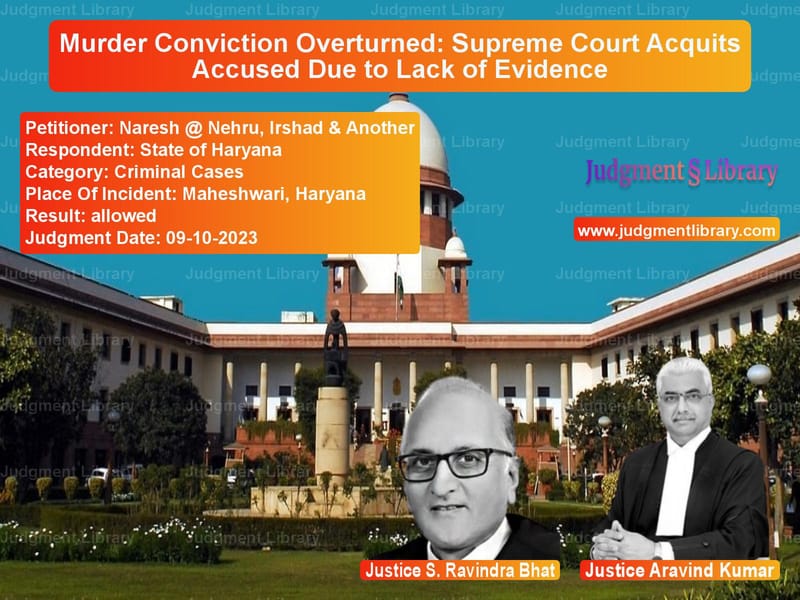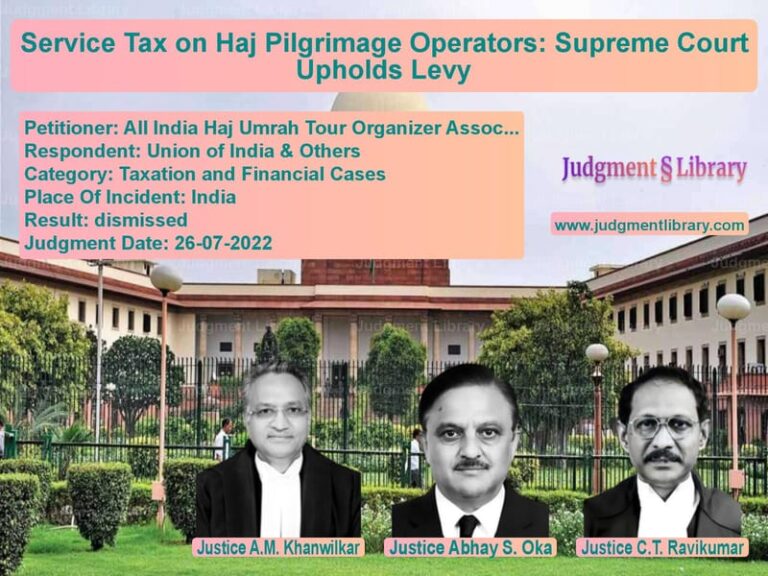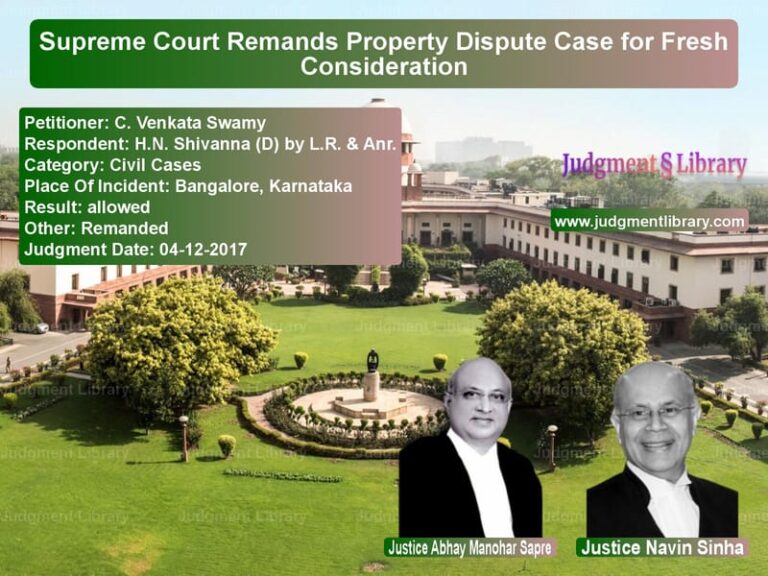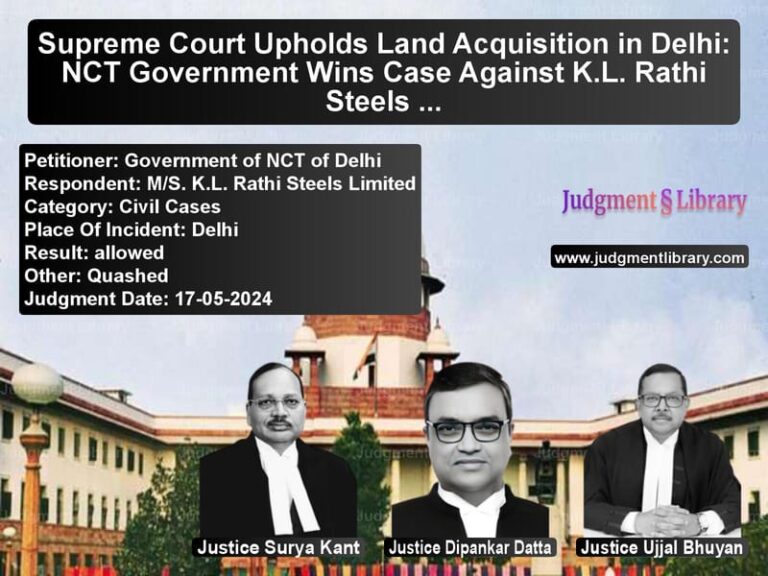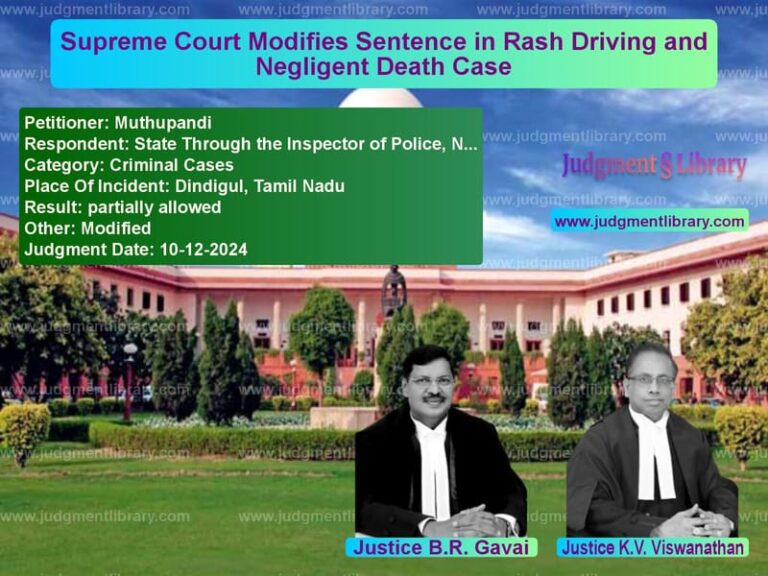Murder Conviction Overturned: Supreme Court Acquits Accused Due to Lack of Evidence
The case of Naresh @ Nehru & Ors. v. State of Haryana involved a complex legal battle surrounding a murder conviction under Section 302 read with Section 149 of the Indian Penal Code (IPC). The Supreme Court’s ruling in this case provides a detailed examination of the evidentiary requirements for establishing guilt in criminal cases, particularly when relying on eyewitness testimony and forensic evidence.
Background of the Case
On 22nd April 2016, a shooting incident occurred in Maheshwari village, Haryana. According to the prosecution, Ajay and Suraj were chased by three motorcycles, with the assailants wielding weapons. The assailants allegedly fired a country-made revolver at Ajay, hitting him in the head. He succumbed to his injuries the following day. Based on statements from Mohit @ Kala, a cousin of the victim, an FIR was registered under Sections 148, 149, and 307 IPC, along with Section 25 of the Arms Act. After Ajay’s death, the charge was altered to Section 302 IPC.
The prosecution presented various pieces of evidence, including eyewitness testimony, CCTV footage, and alleged confessional statements by the accused. The trial court convicted the appellants, which was upheld by the Punjab and Haryana High Court.
Arguments by the Appellants
The defense primarily contended that the conviction was based on unreliable and contradictory evidence. Key arguments included:
- PW-9 (Mohit @ Kala), the prosecution’s star witness, had inconsistencies in his statements. He did not name the appellants in his initial FIR but later identified them in court.
- The CCTV footage used to establish the presence of the accused was questionable. It was recorded on a mobile phone, transferred to a CD, and presented to the police over a month later, raising concerns about possible tampering.
- No Test Identification Parade (TIP) was conducted. The accused were identified for the first time in court, violating basic evidentiary procedures.
- The alleged confessional statements of the accused were inadmissible under Sections 25 and 26 of the Indian Evidence Act, as they were made while in police custody.
- There was no direct evidence linking the appellants to the common object of murder. The appellants were allegedly present but did not fire the gun.
Supreme Court’s Judgment
The Supreme Court carefully reviewed the case and overturned the conviction. The key reasons for acquittal were:
- Unreliable Witness Testimony: The prosecution’s primary witness (PW-9) had made contradictory statements, raising doubts about his credibility. He initially named only two accused but later identified others in court without prior reference.
- Flawed CCTV Evidence: The video footage was not properly authenticated as per Section 65B of the Indian Evidence Act. Additionally, the footage was unclear, and even the trial court noted that the faces of the assailants were not visible.
- No Test Identification Parade: The failure to conduct a TIP weakened the prosecution’s case, as the accused were identified for the first time in court.
- Absence of a Common Object: Under Section 149 IPC, a common object must be established to hold all members of an unlawful assembly liable. The Supreme Court found no evidence that the appellants shared a common object to commit murder.
- Defective Investigation: The prosecution failed to cite key witnesses, including Suraj, who was with the deceased at the time of the attack. The delay in recording statements further weakened the case.
- Inadmissibility of Confessional Statements: The Supreme Court reiterated that confessions made in police custody are inadmissible unless made in the presence of a magistrate.
Legal Precedents Considered
The Court relied on several landmark judgments to support its decision:
- Rai Sandeep @ Deepu v. State (NCT of Delhi): Emphasized that a witness must be of sterling quality to be relied upon.
- Mehboob Ali v. State of Rajasthan: Held that confessions made to police officers are inadmissible.
- Indra Dalal v. State of Haryana: Reaffirmed that an accused cannot be convicted solely based on an inadmissible confession.
- Roy Fernandes v. State of Goa: Explained the requirements for proving a common object under Section 149 IPC.
Final Verdict
The Supreme Court set aside the trial court and High Court rulings, acquitting all the appellants. The Court concluded that the prosecution failed to prove its case beyond a reasonable doubt, and the inconsistencies in evidence led to a miscarriage of justice.
Implications of the Judgment
This ruling reinforces critical legal principles:
- The burden of proof in criminal cases remains high. Mere suspicion or circumstantial evidence cannot justify a conviction.
- Investigative lapses can be fatal to a prosecution’s case. Proper procedures, such as Test Identification Parades and forensic verification of evidence, are essential.
- Courts must scrutinize witness testimonies rigorously. Any inconsistencies or contradictions weaken the prosecution’s case.
- Confessions in police custody cannot be the basis for conviction. Only statements made before a magistrate hold legal weight.
Conclusion
The Supreme Court’s ruling in Naresh @ Nehru & Ors. v. State of Haryana underscores the need for thorough investigations, credible evidence, and adherence to legal procedures. The acquittal serves as a reminder that justice demands irrefutable proof before convicting individuals in serious criminal cases.
Petitioner Name: Naresh @ Nehru, Irshad & Another.Respondent Name: State of Haryana.Judgment By: Justice S. Ravindra Bhat, Justice Aravind Kumar.Place Of Incident: Maheshwari, Haryana.Judgment Date: 09-10-2023.
Don’t miss out on the full details! Download the complete judgment in PDF format below and gain valuable insights instantly!
Download Judgment: naresh-@-nehru,-irsh-vs-state-of-haryana-supreme-court-of-india-judgment-dated-09-10-2023.pdf
Directly Download Judgment: Directly download this Judgment
See all petitions in Murder Cases
See all petitions in Bail and Anticipatory Bail
See all petitions in Theft and Robbery Cases
See all petitions in Judgment by S Ravindra Bhat
See all petitions in Judgment by Aravind Kumar
See all petitions in allowed
See all petitions in supreme court of India judgments October 2023
See all petitions in 2023 judgments
See all posts in Criminal Cases Category
See all allowed petitions in Criminal Cases Category
See all Dismissed petitions in Criminal Cases Category
See all partially allowed petitions in Criminal Cases Category

